Charles E W Bean, Diaries, AWM38 3DRL 606/275/1 - 1918 - 1938 - Part 21

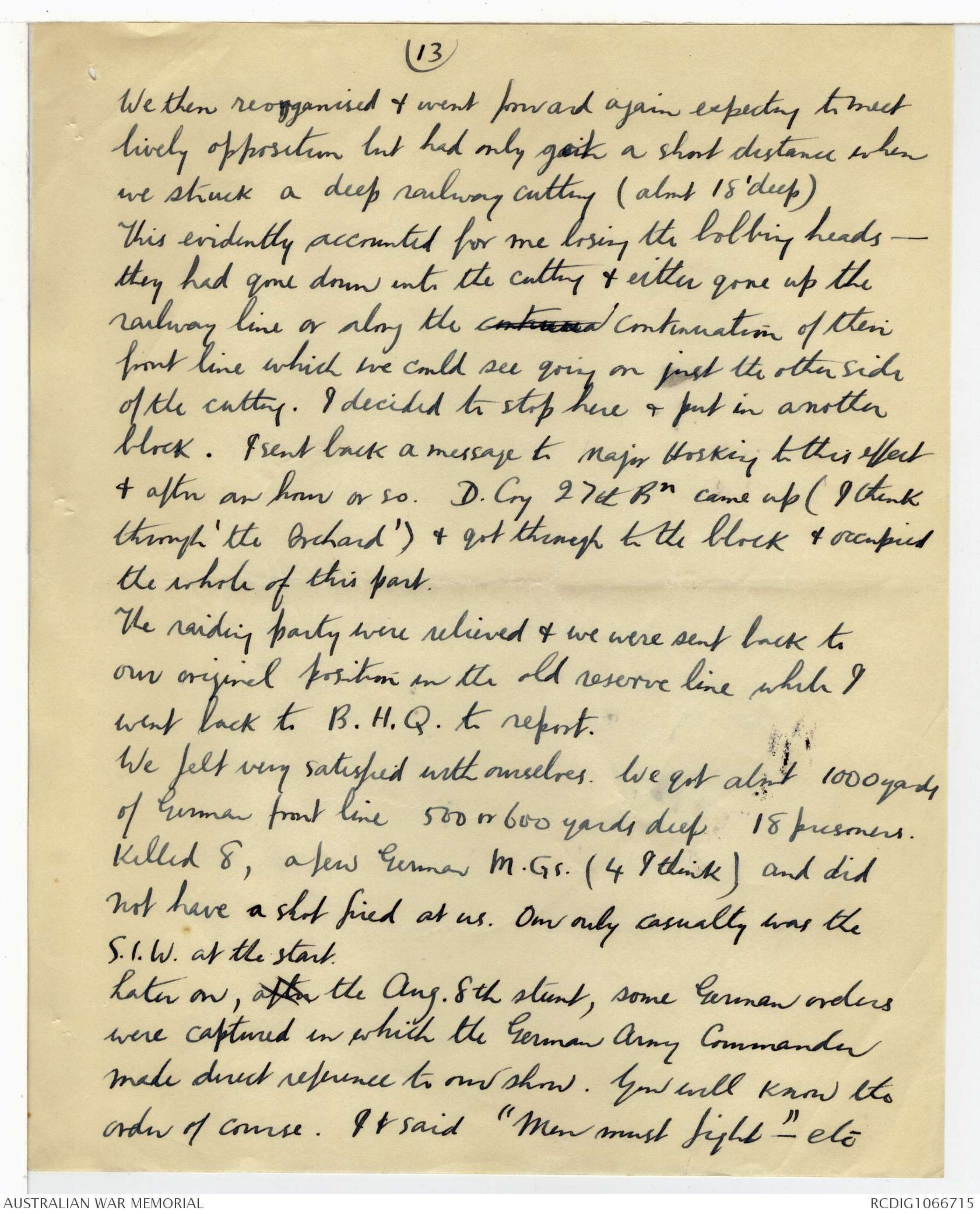
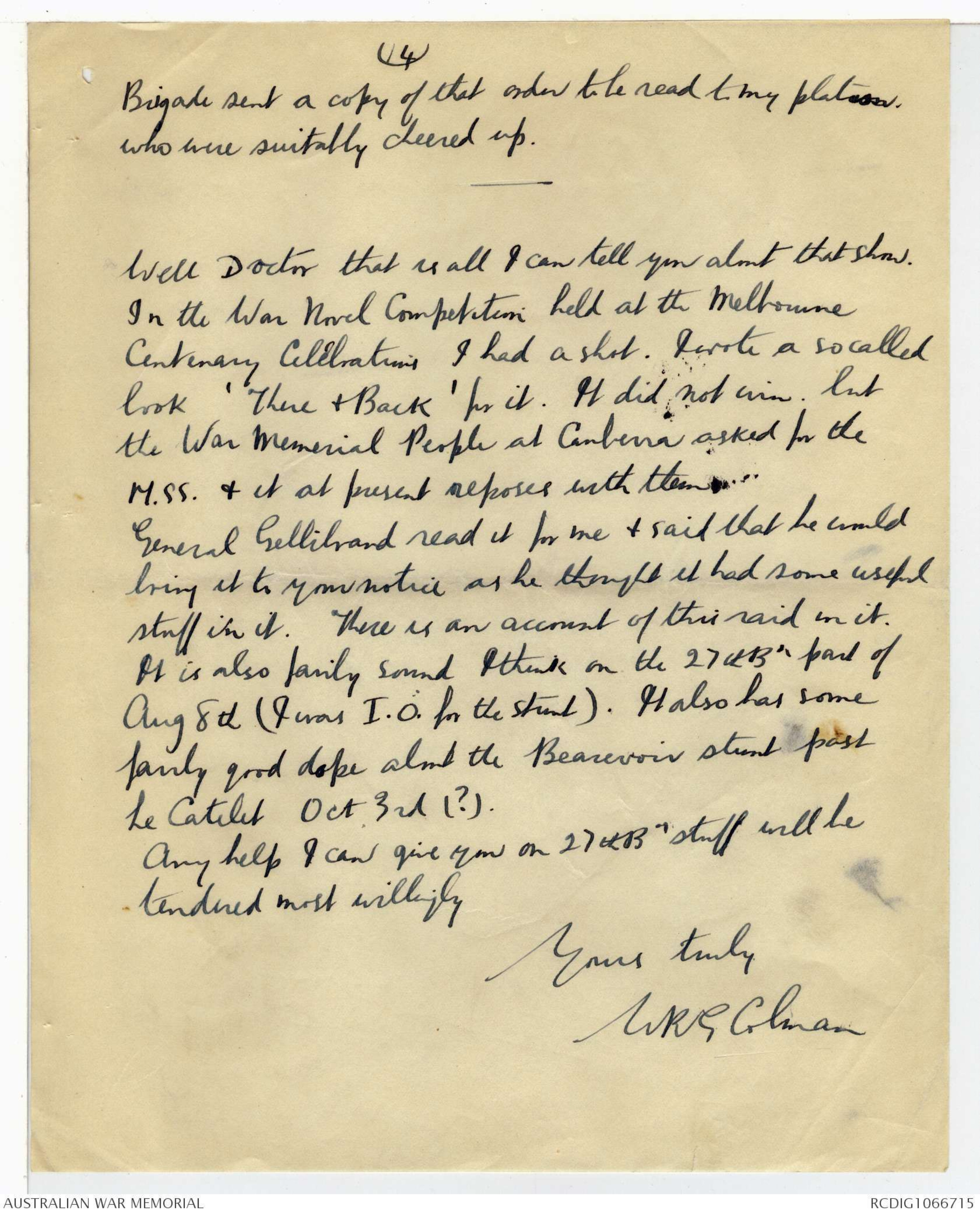
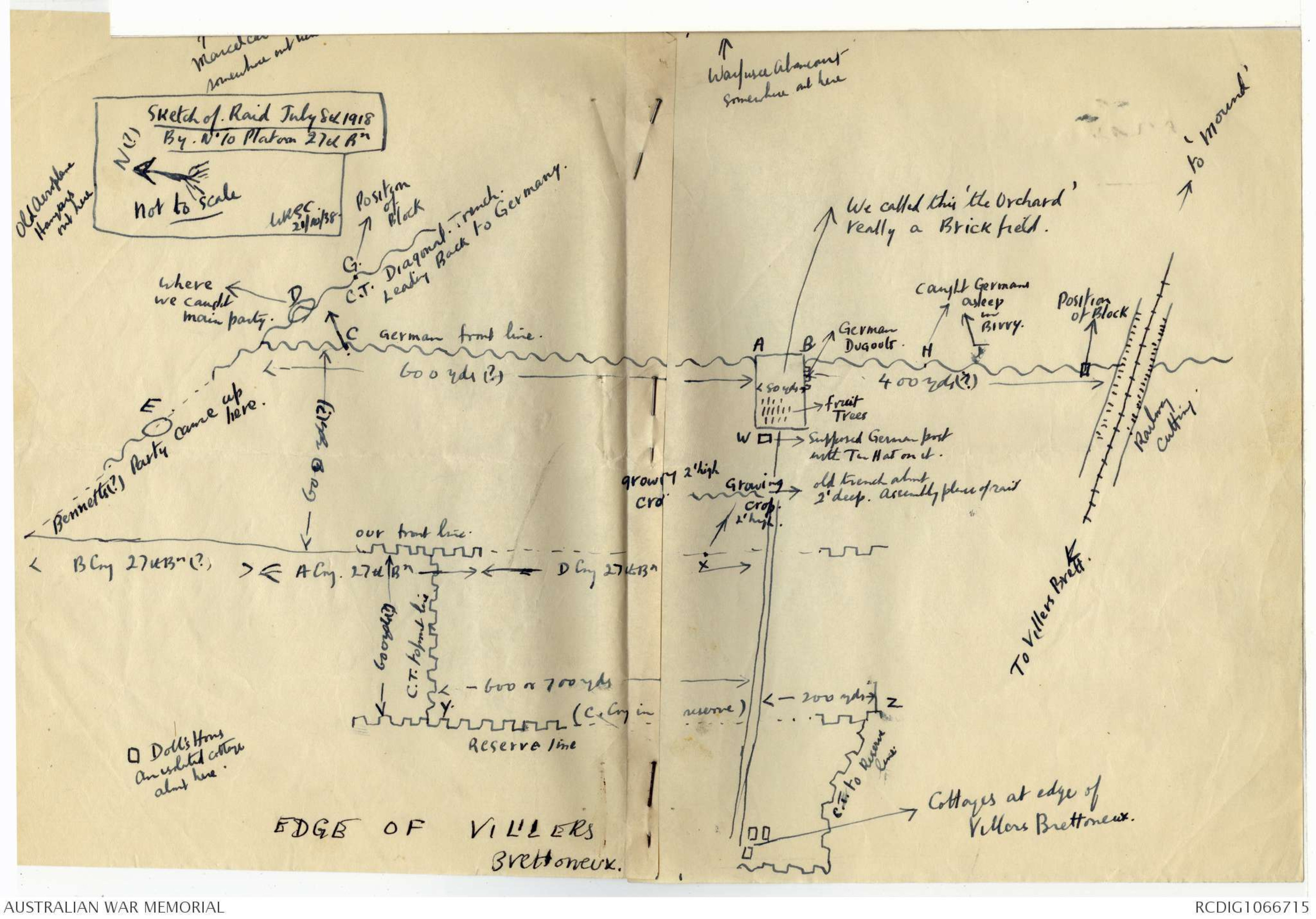
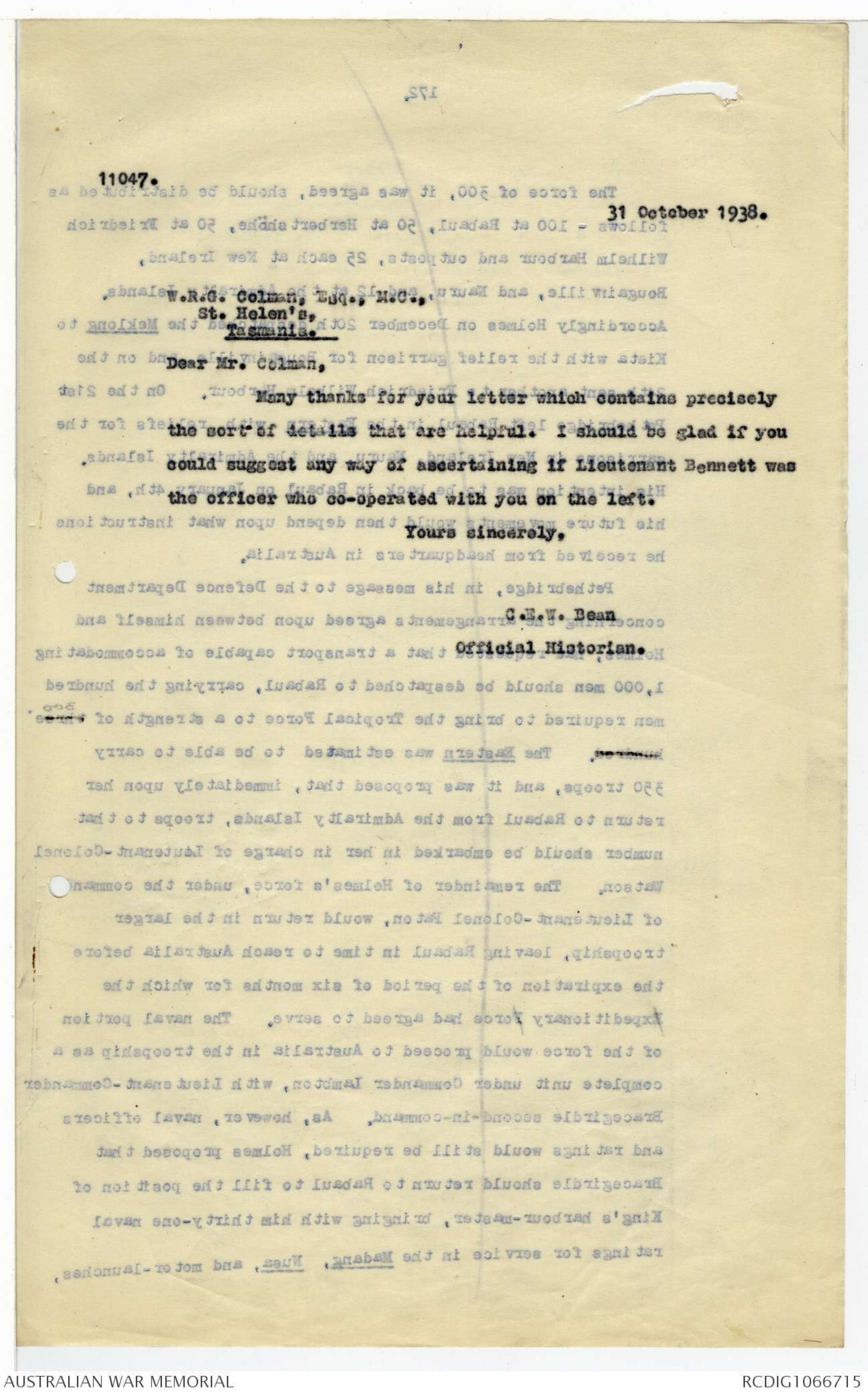
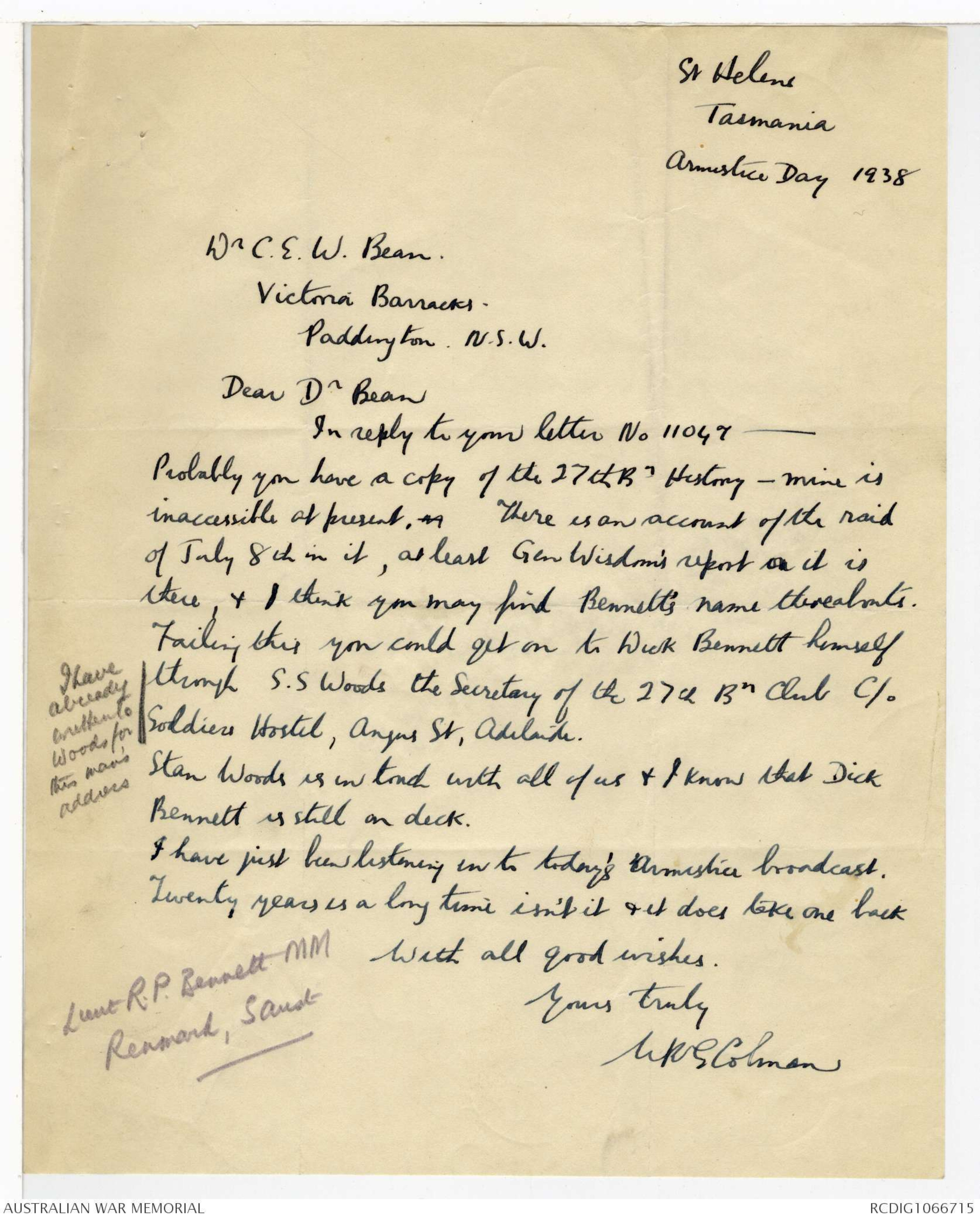
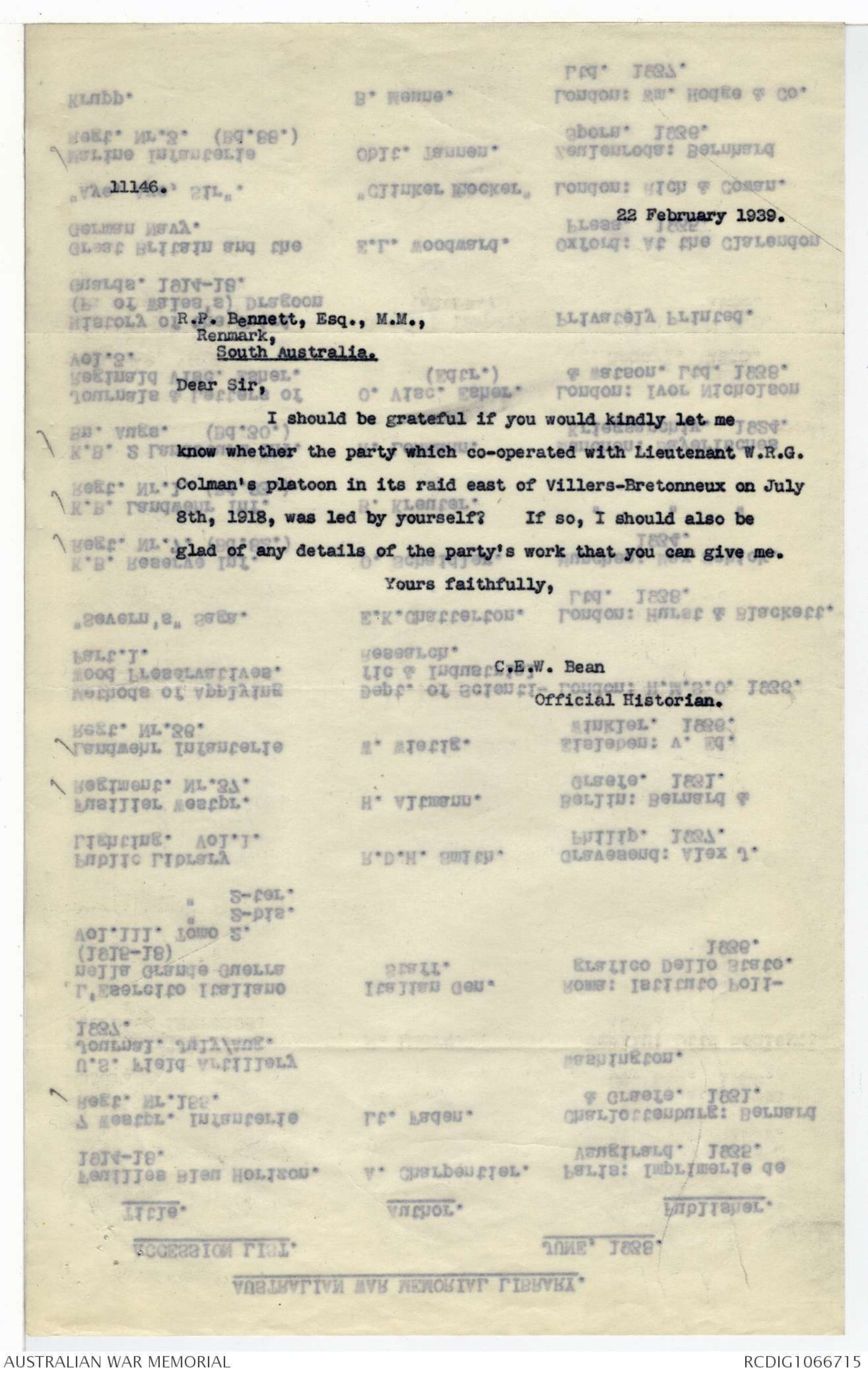
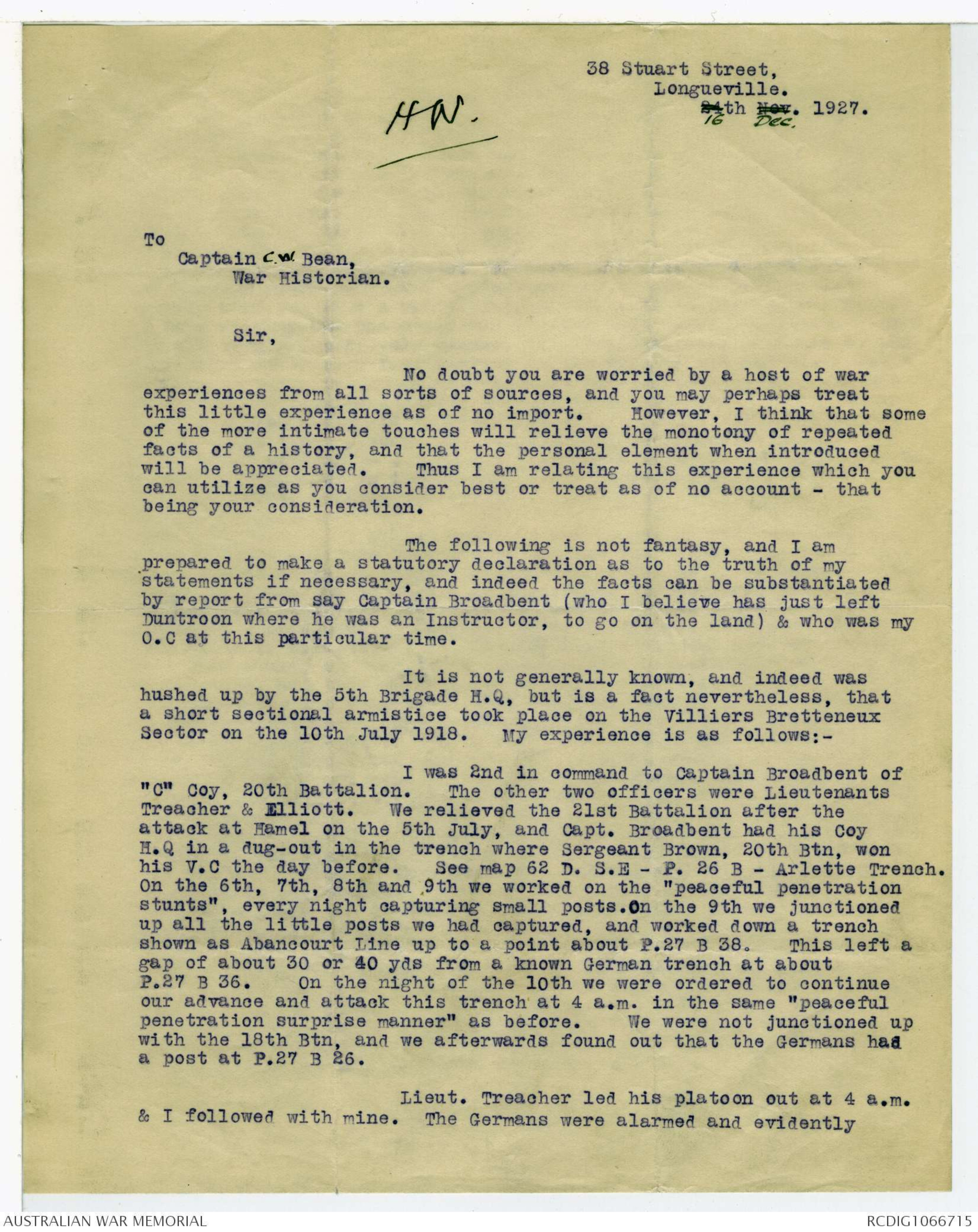
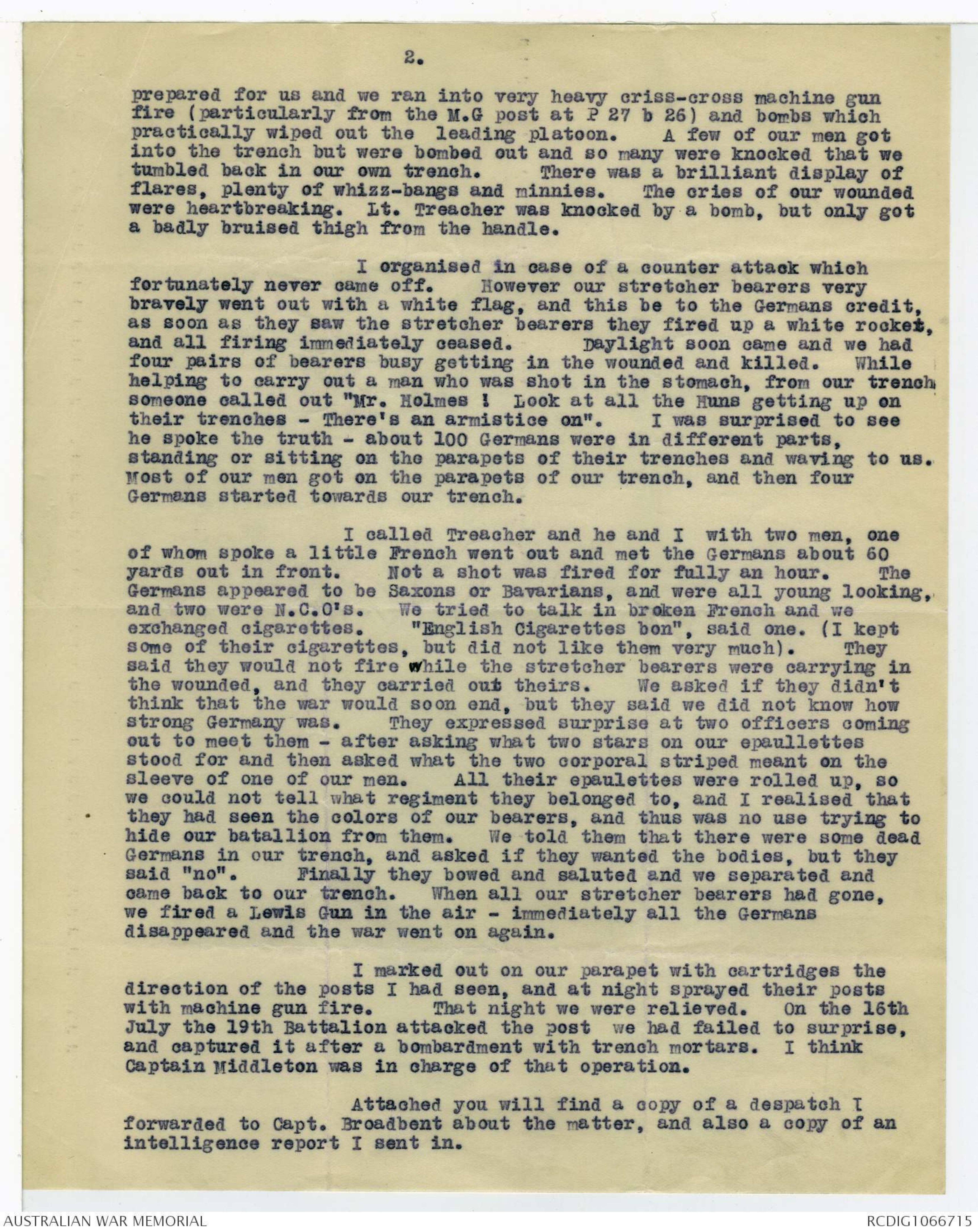
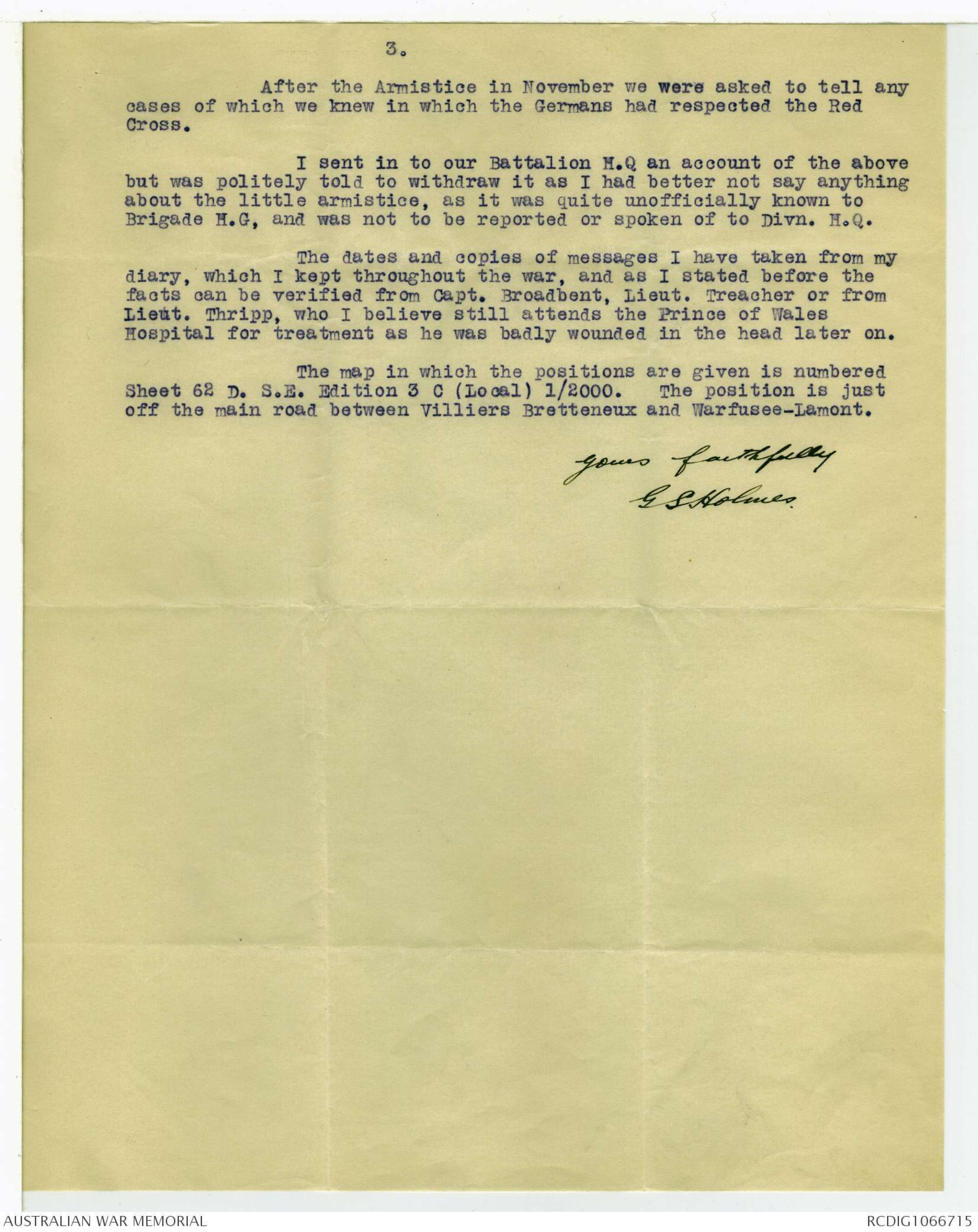
12
"Shut up", I muttered hoarsely, "or I will stick you".
He jabbered on warning as I believe his pals in the
trench ahead. The damage was done - he was too good
a soldier to murder - we let him live.
I had a look over the top before we went on & about
80 ya^rds ahead I could see 4 or 5 heads bobbing along the
trench carrying a machine gun.
Acting on impulse I got out of the trenched and ran along
on the side after them. I got to within about 40 yards
(I must have been 150 yards ahead of my party by this time)
when I got the breeze up about the possibility of getting cut
off by any Germans in dugouts behind me. I stopped and
had a couple of shots at the bobbing heads with my the
rifle I was carrying but evidently missed or at least I
did not stop any of them as we found later.
Just then the bobbing heads disappeared from sight & I
thought they must have turned at bay so I quickly jumped
into the trench & yelled to our party to come on as
quickly as they could. I did not like myself as I could
expect to be attacked from either side & I was in the
way of any strays that our people might force along ahead
of them. The trench proved to have emptied itself however
& soon my people came up. We yelled out to one another
so that we should not bomb one another as we made contact.
13
We then reorganised & went forward again expecting to meet
lively opposition but had only got a short distance when
we struck a deep railway cutting (about 18' deep)
This evidently accounted for me losing the bobbing heads -
they had gone down into the cutting & either gone up the
railway line or along the continual continuation of their
front line which we could see going on just the other side
of the cutting. I decided to stop here & put in another
block. I sent back a message to Major Hosking to this effect
& after an hour or so. D. Coy 27th Bn came up (I think
through 'the Orchard') & got through to the block & occupied
the whole of this part.
The raiding party were relieved & we were sent back to
our original position in the old reserve line which I
went back to B.H.Q. to report.
We felt very satisfied with ourselves. We got about 1000 yards
of German front line 500 or 600 yards deep. 18 prisoners.
Killed 8, a few German M.Gs. (4 I think) and did
not have a shot fired at us. Our only casualty was the
S.I.W. at the start.
Later on, after the Aug. 8th stunt, some German orders
were captured in which the German Army Commander
made direct reference to our show. You will know the
order of course. It said "Men must fight" - etc
14
Brigade sent a copy of that order to be read to my platoon.
who were suitably cheered up.
Well Doctor that is all I can tell you about that show.
In the War Novel Competition held at the Melbourne
Centenary Celebrations I had a shot. I wrote a so called
book 'There & Back' for it. It did not win. but
the War Memorial People at Canberra asked for the
M.SS. & it at present reposes with them ....
General Gellibrand read it for me & said that he would
bring it to your notice as he thought it had some useful
stuff in it. There is an account of this raid in it.
It is also fairly sound I think on the 27th Bn part of
Aug 8th (I was I.O. for the stunt). It also has some
fairly good dope about the Bearevoir stunt past
Le Catelet Oct 3rd (?).
Any help I can give you on 27th Bn stuff will be
tendered most willingly
Your truly
WRG Colman
Hand drawn diagram - see original document
11047.
31 October 1938.
W.R.G. Colman, Esq., M.C.,
St. Helen's,
Tasmania.
Dear Mr. Colman,
Many thanks for your letter which contains precisely
the sort of details that are helpful. I should be glad if you
could suggest any way of ascertaining if Lieutenant Bennett was
the officer who co-operated with you on the left.
Yours Sincerely,
C.E.W. Bean
Official Historian.
St Helens
Tasmania
Armistice Day 1938
Dr C.E.W. Bean.
Victoria Barracks.
Paddington. N.S.W.
Dear Dr Bean
In reply to your letter No 11047 -
Probably you have a copy of the 27th Bn History - mine is
inaccessible at present, in There is an account of the raid
of July 8th in it, as least Gen Wisdom's report on it is
there, & I think you may find Bennett's name thereabouts.
Failing this you could get on to Dick Bennett himself
[*I have
already
written to
Woods for
this man's
address*]
through S.S Woods the Secretary of the 27th Bn Club C/o
Soldiers Hostel, Angus St, Adelaide.
Stan Woods is in touch with all of us & I know that Dick
Bennett is still on deck.
I have just ben listening in to today's Armistice broadcast.
Twenty years is a long time isn't it & it does take one back
With all good wishes.
Yours truly
WRG Colman
[*Lieut R.P. Bennett MM
Renmark, S Aust*]
11146.
22 February 1939.
R.P. Bennett, Esq., M.M.,
Renmark,
South Australia.
Dear Sir,
I should be grateful if you would kindly let me
know whether the party which co-operated with Lieutenant W.R.G.
Colman's platoon in its raid east of Villers-Bretonneux on July
8th, 1918, was led by yourself? If so, I should also be
glad of any details of the party's work that you can give me.
Yours faithfully,
C.E.W. Bean
Official Historian.
38 Stuart Street
Longueville.24 16th Nov. Dec. 1927.
HN.
To
Captain C.W. Bean
War Historian.
Sir,
No doubt you are worried by a host of war
experiences from all sorts of sources, and you may perhaps treat
this little experience as of no import. However, I think that some
of the more intimate touches will relieve the monotony of repeated
facts of a history, and that the personal element when introduced
will be appreciated. Thus I am relating this experience which you
can utilize as you consider best or treat as of no account - that
being your consideration.
The following is not fantasy, and I am
prepared to make a statutory declaration as to the truth of my
statements if necessary, and indeed the facts can be substantiated
by report from say Captain Broadbent (who I believe has just left
Duntroon where he was an Instructor, to go on the land) & who was my
O.C at this particular time.
It is not generally known; and indeed was
hushed up by the 5th Brigade H.Q, but is a fact nevertheless, that
a short sectional armistice took place on the Villiers Bretteneux
Sector on the 10th July 1918. My experience is as follows:-
I was 2nd in command to Captain Broadbent of
"C" Coy, 20th Battalion. The other two officers were Lieutenants
Treacher & Elliott. We relieved the 21st Battalion after the
attack at Hamel on the 5th July, and Capt. Broadbent had his Coy
H.Q in a dug-out in the trench where Sergeant Brown, 20th Btn, won
his V.C the day before. See map 62 D. S.E - P. 26 B - Arlette Trench.
On the 6th, 7th, 8th and 9th we worked on the "peaceful penetration
stunts", every night capturing small posts. On the 9th we junctioned
up all the little posts we had captured, and worked down a trench
shown as Abancourt Line up to a point about P.27 B 38. This left a
gap of about 30 or 40 yds from a known German trench at about
P.27 B 36. On the night of the 10th we were ordered to continue
our advance and attack this trench at 4 a.m. in the same "peaceful
penetration surprise manner" as before. We were not junctioned up
with the 18th Btn, and we afterwards found out that the Germans had
a post at P.27 B 26.
Lieut. Treacher led his platoon out at 4 a.m.
& I followed with mine. The Germans were alarmed and evidently
2.
prepared for us and we ran into very heavy criss-cross machine gun
fire (particularly from the M.G post at P 27 b 26) and bombs which
practically wiped out the leading platoon. A few of our men got
into the trench but were bombed out and so many were knocked that we
tumbled back in our own trench. There was a brilliant display of
flares, plenty of whizz-bangs and minnies. The cries of our wounded
were heartbreaking. Lt. Treacher was knocked by a bomb, but only got
a badly bruised thigh from the handle.
I organised in case of a counter attack which
fortunately never came off. However our stretcher bearers very
bravely went out with a white flag, and this be to the Germans credit,
as soon as they saw the stretcher bearers they fired up a white rocket,
and all firing immediately ceased. Daylight soon came and we had
four pairs of bearers busy getting in the wounded and killed. While
helping to carry out a man who was shot in the stomach, from our trench
someone called out "Mr. Holmes: Look at all the Huns getting up on
their trenches - There's an armistice on". I was surprised to see
he spoke the truth - about 100 Germans were in different parts,
standing or sitting on the parapets of their trenches and waving to us.
Most of our men got on the parapets of our trench, and then four
Germans started towards our trench.
I called Treacher and he and I with two men, one
of whom spoke a little French went out and met the Germans about 60
yards out in front. Not a shot was fired for fully an hour. The
Germans appeared to be Saxons or Bavarians, and were all young looking
and two were N.C.O's. We tried to talk in broken French and we
exchanged cigarettes. "English Cigarettes bon", said one. (I kept
some of their cigarettes, but did not like them very much). They
said they would not fire while the stretcher bearers were carrying in
the wounded, and they carried out theirs, We asked if they didn't
think that the war would soon end, but they said we did not know how
strong Germany was. They expressed surprise at two officers coming
out to meet them - after asking what two stars on our epaullettes
stood for and then asked what the two corporal striped meant on the
sleeve of one of our men. All their epaulettes were rolled up, so
we could not tell what regiment they belonged to, and I realised that
they had seen the colors of our bearers, and thus was no use trying to
hide our batallion from them. We told them that there were some dead
Germans in our trench, and asked if they wanted the bodies, but they
said "no". Finally they bowed and saluted and we separated and
came back to our trench. When all our stretcher bearers had gone,
we fired a Lewis Gun in the air - immediately all the Germans
disappeared and the war went on again.
I marked out on our parapet with cartridges the
direction of the posts I had seen, and at night sprayed their posts
with machine gun fire. That night we were relieved. On the 16th
July the 19th Battalion attacked the post we had failed to surprise,
and captured it after a bombardment with trench mortars. I think
Captain Middleton was in charge of that operation.
Attached you will find a copy of a despatch I
forwarded to Capt. Broadbent about the matter, and also a copy of an
intelligence report I sent in.
3.
After the Armistice in November we were asked to tell any
cases of which we knew in which the Germans had respected the Red
Cross.
I sent in to our Battalion H.Q an account of the above
but was politely told to withdraw it as I had better not say anything
about the little armistice, as it was quite unofficially known to
Brigade H.G, and was not to be reported or spoken of to Divn. H.Q.
The dates and copies of messages I have taken from my
diary, which I kept throughout the war, and as I stated before the
facts can be verified from Capt. Broadbent, Lieut. Treacher or from
Lieut. Thripp, who I believe still attends the Prince of Wales
Hospital for treatment as he was badly wounded in the head later on.
The map in which the positions are given is numbered
Sheet 62 D. S.E. Edition 3 C (Local) 1/2000. The position is just
off the main road between Villiers Bretteneux and Warfusee-Lamont.
yours faithfully
GS Holmes.
 Maralyn K
Maralyn KThis transcription item is now locked to you for editing. To release the lock either Save your changes or Cancel.
This lock will be automatically released after 60 minutes of inactivity.